A Conversation With Stephanie Laurens
by Claire E. White
In 1997, Australian romance author Stephanie Laurens
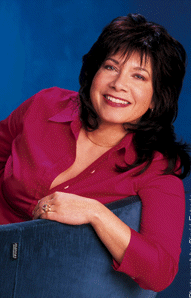
|
Before she became an international bestselling author, Stephanie spent nineteen years as a cancer researcher. She holds a Ph.D. in biochemistry and rose to become the head of her own lab. But as she advanced in her field, her work became more and more filled with administrative tasks; she longed for a creative outlet. A lifelong romance fan herself, she eventually ran out of books to read. Her solution? To write a book that she would enjoy reading. Her specialty is the British Regency period, from approximately 1800 to 1837, when the idea of romantic love was just being accepted in polite society. Stephanie's books reflect a wealth of detail about the period, but they are primarily character-driven stories, with romance as the focus.
In Captain Jack's Woman, readers got their first glimpse of the covert operations that went on during the Peninsula military campaigns and helped set the stage for her Bastion Club series. Seven of London's most eligible bachelors band together to form The Bastion Club, an elite society of gentlemen and former secret agents who were disbanded after Waterloo and now must reintegrate into society. Of course, that means they must find appropriate wives. The Lady Chosen (Avon) and A Gentleman's Honor (Avon) both feature members of The Bastion Club.
Her other series, the Cynster series, has been phenomenally successful. Beginning with All About Passion (Avon), the first six books in the series deal with the stories of the six cousins known to the ton as the Bar Cynster. The Cynster men are intelligent, hardheaded, arrogant alpha males, who like to be in control. But when they meet the right woman, they usually find -- to their intense horror -- that love has made them willing to compromise and to make a lasting commitment. The latest book in the Cynster series is The Ideal Bride (William Morrow), which immediately hit every major bestseller list. Michael Anstruther-Wetherby is related to the Cynsters; his sister is married to Devil Cynster, the Duke of St. Ives. Michael is a rising politician who needs a polished, diplomatic wife immediately. As Stephanie describes the story, "In viewing his endeavors, we see the Cynster characteristics adapted to the political sphere -- the charm, the ruthlessness, the arrogance, but also the honor and protectiveness that is a fundamental part of the Cynster code." After retreating from his first choice Elizabeth, (who loves someone else), Michael sets his cap for Elizabeth's Aunt Caro, a widow with great diplomatic skills. But Caro has vowed never to marry again; for one thing, wealthy widows were the only women of that time period who had freedom and independence. Another complication is that someone is trying to kill Caro.
The Ideal Bride is set against the familiar backdrop of the Cynster world -- the London ballrooms and drawing rooms, the familiar haunts of society's elite. The Ideal Bride explores new territory for Laurens: the political world, yet her trademark sensuality and vivid characterizations are in full force. It is also one of Laurens' funniest and wittiest books to date, as Caro and the politician match wits, using the complicated societal rules of the day to achieve their ends.
Stephanie took a break from writing her next book to share her thoughts about The Ideal Bride, how she finds her muse and why she believes in love at first sight.
What did you like to read when you were a little girl?
Enid Blyton, all her stuff, the Chalet School series, lots of other similar types of books. Adventure and mystery and Sherlock Holmes and Father Brown, later. Also some of the Disney stuff (Trixie Belden, Annette) mysteries that used to be around.
Was there anyone in particular who inspired you or encouraged you when you were growing up, either as a writer or a scientist?
Not specifically. I did have one uncle in particular who was a fabulous storyteller for children -- I'd say that's where I got the storytelling gene from.
I'd like to talk about your latest book, The Ideal Bride. This is a very different and fascinating book, dealing with the world of a political wife in Regency England. During this time period women couldn't even vote, yet certain political hostesses exercised a considerable amount of power behind the scenes. What drew you to write about the political world?
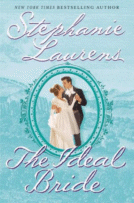
|
Michael is the brother to Honoria, who married Devil Cynster in the first of the Cynster novels. I really don't recall having read a book with a hero quite like Michael. He's a politician, not always the most admired of professions (in the U.S., at least) yet Michael is very appealing. Did it surprise you to find yourself writing about a politician -- someone who works a room, networks constantly and loves to entertain? He is certainly a world away from Devil Cynster, for example.
Do you think so? Devil Cynster could and does do all those things when he wishes. Note there's a touch of politics referred to in All About Passion, where Chillingworth and Devil are clearly working on political matters, as of course they would -- they were members of the government by virtue of them being peers, and therefore having hereditary seats in the House of Lords.
The nobility and aristocracy were always political animals -- they just didn't need to be elected!
| "I do think it's one of the sad things about modern life that so many young people have come to firmly believe that love, let alone love at first sight, is a fantasy." |
Admittedly, this is not so today. While I think there are definite echoes shared between the world of Regency England and today, I do think there are also differences -- and politicians and what they were like is one. Aside from all else, remember there was virtually no "media" then as there is now, which necessarily makes things much different.
The opening chapters of The Ideal Bride are so entertaining, so very funny as Caro and her niece Elizabeth work to subtly manipulate Michael into not proposing to Elizabeth. How important is a sense of humor to you in life?
Very important. I have to admit the little ironies and unexpected and usually unintentional gaffes and so on -- the little moments of laughter in day to day living -- is something I'd describe as one of the joys of life.
What was the greatest challenge in writing The Ideal Bride?
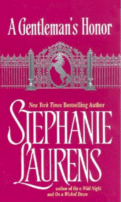
|
It seems to me that as far as creativity is concerned, fiction authors tend to fall into two groups: one group's ideas just come to them, fully formed with characters and a plot. The challenge for these authors is to get all the ideas down on paper, before they forget. Writer's block is never a problem for these authors. The other group seems to sit down at the computer and consciously thinks up a plot, characters, the works, a more workmanlike approach. You obviously fall in the first group. As a scientist, how do you think (or speculate) this creativity process works? What is a "muse"? Is this ability genetic, in your opinion?
Let me first say this is a fabulous question, and one of the best and most succinct descriptions of how authors work -- the two types -- that I've come across. And yes, I definitely fall into the first group. However, I edit my work like a member of the second group -- I deconstruct and then reconstruct, to make the whole stronger and make sure all the details and motivations hang together correctly. That's where the scientist-side gets a say.
But to address your main question -- how does creativity work -- I wish I knew. As a scientist, you do learn that there are some things that can't be logically explained. A soul is one. Creativity -- what drives this -- is another. I've been with groups of authors when this question is discussed, usually in terms of the authors' answer to the question: how do you make up your stories? In my experience, the final answer everyone inevitably agrees on is: we don't know. The stories just come, appear in my head, and I then write them, give them flesh and blood, so to speak.
A "muse" is the voice in your head that tells you, or shows you in my case, the stories. Yes, I'll confess -- authors hear voices in their heads, and see visions, too.
As for whether this is an innate talent or a learned skill, my feeling having worked with many people wanting to write stores, and also the answer I've got from all other authors with whom I've discussed this, is that it's an innate talent, but one that naturally benefits from learning and developing and being used. In other words, you might be born with the talent to be a storyteller or not, but even if you are, whether you'll ever be a good storyteller depends on how you develop whatever talent you are born with. Not everyone is born with the same degree of storytelling talent, and how many people are born with any storytelling talent at all is another question entirely, one to which I don't know the answer.
What qualities make a compelling fictional hero? What qualities make a compelling real-life hero?
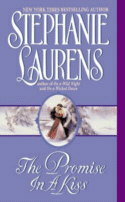
|
The answer to the second question is, therefore, pretty much the same as the answer to the first. The most compelling real-life hero is the one who demonstrates the traits the audience thinks are most important in whatever situation is being addressed. The only difference that I can see that operates between what works for heroes fictionally versus what works in real life, is that in fiction set in other times, both historical and also futuristic, then there's a little more leeway in what is acceptable in the personal traits of the hero. To give two examples: first, writing in the Regency era, I use a more overtly arrogant and dominant hero than would work in real life today, but his other traits are the ones women see as even more important in a romantic hero. Second, in futuristic fiction, it's possible to use a much more nerdy hero than would be hero-material in real life.
I wondered what your thoughts are about hair. Hairstyles are quite important today, as they were in the Regency period. What was considered the ideal hair to have in the Regency? In the Ideal Bride, the heroine's hair is actually frizzy! (I loved that, by the way). How much do we know about hair care in the Regency period?
Quite a bit, actually. In terms of style, there's lots of reference works that have drawn on the ladies' periodicals of the time, which discussed and showed pictures of hairstyles, as ladies' periodicals still tend to do.
| "How does creativity work? I wish I knew. As a scientist, you do learn that there are some things that can't be logically explained. A soul is one. Creativity -- what drives this -- is another." |
As for the ideal hairstyle in the Regency period, that changed over that period -- just like today, hairstyles changed literally year to year, best color changed...thinking about it, (and having two now-adult daughters), there's not much that's different between then and now. They did have hairdressers, but they came to the house -- no salons.
Do you believe in love at first sight? It seems as if most of the heroes in the Cynster series at least fall in lust at first sight, if not love.
Not only believe in it -- know it, lived it -- still living it. And I've met many, many others who can say the same.
Of course, no matter it being love, the first impulse is naturally to put it -- that moment of connection -- down to lust, which of course is always simultaneously present in such situations. So falling in lust at first sight is what people, both male and female, often tell themselves is what is happening, but they always learn the truth soon enough.
I do think it's one of the sad things about modern life that so many young people have come to firmly believe that love, let alone love at first sight, is a fantasy.
So many romance novels are set in the Regency time period, which was really a very short period of time: 1811-1820. Why is this time period so popular for historical romances? What is the appeal of that time period?
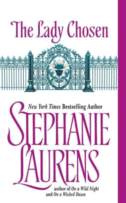
|
In addition, the Regency era is alive with possibilities for adventure and intrigue -- there were wars, smuggling, gambling, racing, all sorts of business dealings, scandals, and more. Such items make for a rich diversity of backgrounds, a varied and colorful palette with which to create backgrounds for stories.
If you were magically forced to be one of your own heroines for a year, which one would you be and why?
I get to chose? Hmm...I think Honoria (from Devil's Bride), as a woman who wields a considerable degree of power in her life. I think her life in the wider sense must be incredibly interesting, and very busy -- lots of family, both immediate and wider, and also lots of other social involvements. Caro, from The Ideal Bride, would probably come second, for much the same reasons. As all my heroines have gorgeous, fabulous, caring husbands, that's not any basis for choice -- you get the fabulous husband and wonderful relationship and family connotations whoever you chose -- so I'd base my choice on what else they have going on in their lives.
How has being a mother affected you as a writer?
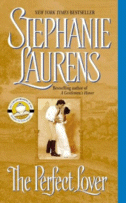
|
The media has an increasing effect on the minds of children, with television, computers, games and films all competing for the attention of children and teens. Are you bothered by the amount of sex and/or violence in the programming directed at children? How do you monitor what your child sees?
My children are now rather older, and Australia has for decades had a very strict policy on violence (and sex, although that's never been a problem) in children's programming in TV, computer games and film. So that wasn't an issue because it largely didn't happen here. The internet also wasn't an issue when my children were young enough to be affected. However, when my daughters were old enough to watch adult viewing, we were usually there with them -- in fact, both of them today will hit the button if anything violent is shown even on the news, let alone in a program. Violence seems to be a complete turn-off for them...I wonder if the programmers realize? Well, checking out the offerings here (now) I'd say they do. There's not all that much violence about, (in fact, I can't see much at all). As for sex, there's never been that much of that around on the usual media here, and as for the internet, my daughters' generation is never going to waste their time looking at stuff on the internet -- they grew up with it and treat it as a communication channel and information source, but for entertainment? Puhleeze... There's much better entertainment all around them, and they naturally turn to that. I'm perfectly happy to encourage that attitude.
'
What are some of your pet peeves in life?
That there aren't an expandable number of hours in every day. Or expandable number of days in every week. Give me either, and I'd be happy as a clam forever.
What is your advice to the aspiring romance novelist?
Read a lot. Especially in the genre. First. Then write the stories that have come to you (from your muse, as I mentioned before), in your voice and no one else's, scripting them to meet the demands of the modern audience you're trying to reach, and then, before you try to market the results, learn about the industry by joining the appropriate writers' group.
As a former cancer researcher, do you keep up with any of the latest discoveries? Do you think there will ever be a "cure" for cancer? Do you think stem cell research will be helpful in the area of cancer research?
I hear only about the latest discoveries that are reported in the press, although of course I tend to pick up on such things.
Because of the molecular basis of cancer, there's very unlikely to be a general "cure for cancer," although the chance of "cures" for particular cancers, especially at early stages, is possible.
As for stem cell research, that's not a small subject or question, but leaving aside all the qualifications and discussion, the simple answer is yes, it has the potential to be helpful in cancer research, and possibly even more than helpful.
A lot has happened since our last interview. In 1998, you were a rising star at Avon, now you're an internationally bestselling author, as well as a wife and mother. How do you deal with the stress of publishing deadlines, tours and family? Do you have any secrets for juggling your workload?
| "A 'muse' is the voice in your head that tells you, or shows you in my case, the stories. Yes, I'll confess -- authors hear voices in their heads, and see visions, too." |
The Cynster books and the newer Bastion Club series are incredibly popular. Readers of series, like the Cynster series, are both loyal and notoriously outspoken about their like and dislikes. How influenced are you by your fans' comments about the books?
Readers' positive comments about books are rarely specific -- it's usually all bubbling delight and happiness, and that certainly makes me feel good, and encourages me to keep writing, which, from the point of view of those fans who like my works, is a desirable outcome if they want to read more Stephanie Laurens' books. So positive fan mail does have a positive outcome, but in the general sense, rather than the specific.
As to the rare comment about something specific, by the time one book goes out, I'm usually working, not on the next, but the one after that, if not the second after that. ie. I'm writing two to three books ahead of what's published, which is normal enough. Having specific reader comments influence an author who's two to three books on from where they were (when the comment was applicable), when the reader hasn't yet read the intervening one to two works (which haven't yet been published)...I'm not sure this would be sensible, let alone wise. Readers necessarily are commenting on what's in their hands, not what they haven't yet experienced; they might like what they haven't yet read even more.
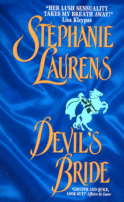
|
I think that probably makes my point about the wisdom of trying to cater to readers' comments. Such comments are valid as the responses of individual readers, but they cannot be taken as the response of the entire (greater than one million) audience I write for. If my audience as a whole disliked what I write, they'd stop buying my books, and that would be that.
You dedicated The Ideal Bride to your "four fellow rogue authors, Victoria Alexander, Susan Andersen, Patti Berg and Linda Needham." Would you share the story behind that special dedication?
I'm laughing. OK -- the five of us have grown close over the years, even though we all live far apart. We all originally wrote for the same publishing house, four of us still do while one has moved to a different publishing house; some of us started at the same time, moving up through the ranks together, all that. We've shared rooms at conferences, and so on; in general, we've shared the trials and tribulations of being published romance authors for going on six years.
As to our group name, recently we got together immediately after the last RWA National Conference in New York and went for a tour of Rhode Island and the mansions there. During the conference week, some of us were rooming together, too, and the term "rogue authors" was coined by one of our editors when she heard about our projected excursion. So we dubbed ourselves the Roving Band of Rogue Authors on our Rhode Island Tour, and had a fabulous time -- the dedication is a reminder for us all of that trip.
We plan to do more "Rogue Author Tours" in the future, but not this year. I don't do many book tours as I live too far away.
Can you give us a sneak peek into your next projects?
The next book to be released will be the third Bastion Club novel, A Lady of His Own, the story of Charles St. Austell and his search for a bride. That will be released in October, 2004. After that will come the paperback edition of The Ideal Bride, sometime early in 2005. The next Cynster novel will be Gerrard Debbington's story, and the fourth Bastion Club novel will be Jack Warnefleet's story -- at the end of Charles's story poor Jack is suffering from a bruised ego and a mild concussion; he retreats to his home in Somerset to recuperate, only to find his peace systematically shattered by the local do-gooder, a determined lady who desperately needs a keeper. What Jack can't understand is why he keeps volunteering for the role. There may well be a special or two lurking in the wings over the next few years -- readers can always catch up with the latest news at my website.
Return to the April 2004 issue of The IWJ.
More from Writers Write
